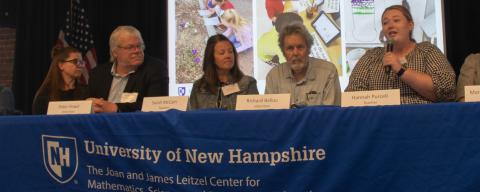New Hampshire Teachers and Volunteers Inspire Students Through Citizen Science
Schoolyard Sites Showcase
Schoolyard SITES is a UNH Cooperative Extension and Leitzel Center professional development program funded by the National Science Foundation (grant # 1721133). The program partners science-based Extension volunteers with New Hampshire elementary teachers to bring new science teaching approaches to the classroom. In this program, the teachers and volunteers explore, develop and implement citizen science projects that relate to New Hampshire’s natural world. They focus on inquiry projects aligned with Next Generation Science Standards (NGSS) in the schoolyard. Lara Gengarelly, UNH Extension science education state specialist and affiliate professor with the UNH Leitzel Center says, “In the U.S., including New Hampshire, elementary teachers often lack sufficient coursework and experience with science content and instructional techniques. Schoolyard SITES provides teachers the needed support through a partnership with Extension volunteers and empowers them to design and teach a citizen science curriculum tailored to their own schoolyard.”
In spring 2023, teachers and volunteers from across the state came together to share their experiences with the Schoolyard SITES program. They discussed their citizen science projects, highlighting how it had transformed their approach to teaching science and shed light on its impact on their students. The teachers' and volunteers’ testimonials provide valuable insights into the effectiveness of the program.
There were a variety of intriguing projects that the teachers and volunteers implemented – from bird monitoring to soil testing to pollinator gardening, and all of which integrated a relevant citizen science platform (Cornell’s FeederWatch, iNaturalist, Journey North, etc.).
UNH Extension volunteer Peter Howd emphasizes the importance of ownership in science, stating, "Something that I found is important in science is ownership — ownership of data and having kids engaged and owning the scientific process themselves. It is important to get the kids to understand that science is not just something in a textbook or a simulation on a computer. It is local; they can go out in their schoolyard and see different environments.” This highlights the program's focus on empowering students to take charge of their scientific learning journey, fostering a sense of ownership and curiosity. By encouraging students to explore their immediate surroundings, the program expands their understanding of science beyond the confines of the classroom, making it relevant and tangible.
The program encourages student agency in the development of projects. Sarah McCain, a fourth-grade teacher says, "Giving the students the agency to help create the project has been really powerful. We have asked them to give feedback on the lessons, the activities and the protocols." By involving students in the decision-making process, Schoolyard SITES fosters a sense of responsibility and investment in the outcomes, leading to increased engagement and enthusiasm.
The impact on students is palpable, as McCain expressed, "Seeing them engaged and really excited about citizen science is inspiring." By participating in field-based projects that contribute to real scientific research, students develop a deeper appreciation for the importance of their contributions. They begin to view themselves as part of a larger scientific community, realizing that their efforts can make a difference.
The event showcasing the Schoolyard SITES program highlighted the transformative power of science education when approached in a different, more engaging way. By partnering with UNH Extension volunteers, elementary teachers in New Hampshire have been able to implement citizen science projects that inspire students to view themselves as active participants in the scientific community while fostering a lifelong love for science.
